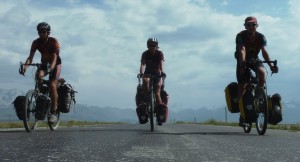The Great British Lake Off
3July 27, 2015 by Rob Gardiner
Our lethargic legs managed to drag us all the way to Lusaka, the Zambian capital, before we heeded their protests and stopped for an impromptu rest day. For once staying at the heart of a somewhat modern metropolis, we expected to spend our time enjoying 21st-century luxuries. Instead, a 36-hour-long power cut left us struggling to find basic amenities, such as running water and sanitation. Luckily, company came in the form of a South African trucker who was awaiting a court appearance for accidentally exporting illegal hardwoods.
However, the time away from the saddle did our muscles some good and we set off with renewed vigour in our limbs. Speeding eastwards, we wound through the forested Zambian hills, with villages peppered along our path. This was our first real glimpse of rural Zambia and we soon discovered how the inhabitants of a country with 80% unemployment keep themselves entertained. Whilst adults revelled in the never-ending joys of setting fire to vegetation and filling the sky with a permanent smoky haze, children waited patiently for us to pass, eager to scream ‘How are you!?’ as loudly and rapidly as was humanly possible. To add to this pleasant sensory assault, hundreds of kilometres of road improvements meant that a thick dust joined the scent of burning brush, coating our bikes, limbs and lungs.

Fortunately, our progress was rapid – mine particularly so. Only a day from Lusaka, a grinding screech tore from my rear wheel and I looked down to see my disc brake rotor resembling a cubist sculpture. Several days of rather too liberated cycling followed, with my front brake capable of slowing me, but reluctant to actually stop the bike.
I quickly resigned myself to riding a one-brake bike for the rest of the trip, but was astonished to discover a rather industrial-looking disc rotor for sale in the town of Chipata, just before the Malawian border. Although appearing better suited to stopping a combine harvester, this circular chunk of steel is now firmly attached to my rear wheel. And it occasionally even helps to slow me down.
Crossing into the hills of Malawi, we struck north, before swinging east towards the country’s vast, eponymous lake. As we rode through rural villages, my odometer ticked past 3,890 kilometres. This irregular figure held significance because it meant that, since setting off in April 2013, I had covered 29,000 kilometres, which is the minimum distance required by the Guinness Book of Records for a circumnavigation of the globe. Wild, impromptu celebrations followed the reaching of this milestone and, just after Andrew had sprayed me with Carlsberg Special Brew, I shook hands with the bewildered and sombre-faced local pastor.
Only fifty kilometres from the lakeshore, as the hills began to fade away, so too did the asphalt. We found ourselves facing the barrier-sealed entrance to the Nkhotakota Game Reserve – through which our road apparently travelled. Striding out to meet us, the park ranger on sentry duty greeted us with a smile and a handshake. Introducing himself as Nico, he kindly offered to let us camp beside his guard post. Soon, a fire blazed as we erected our tent beside the park’s deserted entrance.
Quiet at first, Nico thumbed the pages of an English copy of the The Two Towers until the sun dipped below the horizon. Then, as we shared each other’s food, the conversation began to flow; he showed his knowledge of the habitat that he protected and answered our numerous questions about Malawi, whilst we explained the details of our strange, foreign lives. Nico was relaxed and confident as we chatted, but beside him a shiny M-16 rifle always lay within easy reach, and his tone softened as, early on, he spoke of the death of his first child from cerebral malaria. Both served as stark reminders of the harsh nature of life as a Malawian park ranger.

Our friendship with Nico assured safe passage through the reserve the following morning, in spite of rules prohibiting bicycles from entering. We raced down through the lushly wooded forest as the morning sun began to gleam across the approaching waters of Lake Malawi.
Following the idyllic lakeshore, we pressed northwards for the backpacker retreat of Nkhata Bay. Here, familiar faces presented themselves in the form of a group of Englishmen driving across Southern Africa. Having already crossed paths in Namibia, Zimbabwe and Zambia, it seemed almost serendipitous that we should end up camping metres away from each other in Nkhata Bay. Sharing stories from the road, washed down with cold Malawian beer, we spent a lazy day swimming, snorkelling and paddle boarding in the relaxing waters of Lake Malawi.
Unfortunately, this watery tropical nirvana was only ours for a brief time, whereupon our imposing schedule once again reared its head. Hopping aboard the historic and only somewhat decrepit MV Ilala, we set sail north, along a short stretch of coastline that remains completely inaccessible by road. Passing isolated fishing villages that still rely on the Glasgow-built Ilala’s weekly visits, we stopped to deliver supplies as children in dugout canoes ferried passengers ashore. Finally, after 12 hours of sailing, we disembarked at the small village of Chilumba, just a day’s ride from our next and final country, Tanzania.













Sounds amazing. However Lake Malawi is one of the riskiest places for schistosomiasis so perhaps need to remember that if either of you become unwell in the next couple of weeks. -let’s hope not!
Always quick with the cheerful replies Anne!
We are one step ahead of you, Mum. Picked up some precautionary pills in Malawi and are dosing ourselves up.